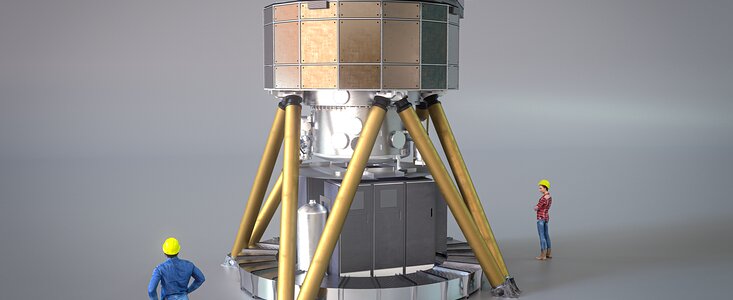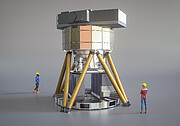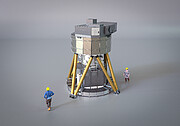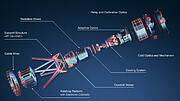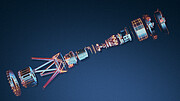Anuncio
El instrumento MICADO del ELT pasa la revisión final de diseño
3 de Septiembre de 2024
El generador de imágenes del infrarrojo cercano con difracción limitada (MICADO, Multi-AO Imaging CamerA for Deep Observations), la potente cámara de alta resolución para el Extremely Large Telescope (ELT) de ESO, ha superado su revisión final de diseño, marcando un hito importante en el camino hacia su puesta en funcionamiento a finales de esta década. Una vez finalizado, MICADO permitirá a los astrónomos tomar imágenes del Universo a una profundidad sin precedentes.
El propósito de esta última parte de la revisión final de diseño (FDR, por sus siglas en inglés), que consta de varias etapas, es dar por concluido el proceso de diseño que se ha estado llevando a cabo durante varios años. Si bien la fabricación no suele comenzarse sino hasta que se aprueba la FDR, la luz verde para fabricar muchos de sus componentes y subsistemas ya se había dado previamente con el objetivo de que el proyecto MICADO siguiera avanzando hacia la primera luz del ELT. Para completar la revisión del diseño, los miembros del consorcio trabajaron con el personal de ESO para aclarar el resto de las cuestiones pendientes sobre el diseño del instrumento. La superación de este hito permitirá que el consorcio MICADO, un equipo de 150 personas distribuidas en seis países, se concentre ahora por completo en la fabricación y prueba del instrumento.
El diseño de MICADO ha sido impulsado por el deseo de lograr una precisión y estabilidad extremadamente altas para alcanzar la alta sensibilidad, resolución, precisión astrométrica y amplia cobertura de longitudes de onda requeridas. Para lograrlo en el entorno del ELT, MICADO se instalará sobre la plataforma del instrumento para que la luz del telescopio pueda transmitirse tanto al sistema de óptica adaptativa que corrige la distorsión atmosférica como al criostato. Aquí, la óptica y los detectores se mantienen a baja temperatura para que puedan trabajar de manera efectiva en longitudes de onda del infrarrojo cercano sin la interferencia de otras fuentes de calor. El funcionamiento detallado del instrumento se controla mediante electrónica, gran parte de la cual está montada justo debajo; y el software permitirá a los usuarios realizar sus observaciones de forma remota.
Este sofisticado diseño permitirá que MICADO obtenga imágenes de alta resolución del Universo que revelen las estructuras detalladas y los mecanismos de formación de galaxias distantes y también permitirá a los astrónomos estudiar estrellas individuales y sistemas estelares en galaxias cercanas, así como planetas y su formación fuera de nuestro sistema solar. Además, MICADO actuará como una herramienta excepcionalmente poderosa para explorar entornos donde las fuerzas gravitacionales son extremadamente fuertes, como los alrededores del agujero negro supermasivo situado en el centro de nuestra galaxia, la Vía Láctea.
Después de algunos años de investigación científica preliminar, las capacidades de MICADO se verán reforzadas cuando se conecte al sistema de óptica adaptativa multiconjugada para las observaciones del ELT (MORFEO, Multiconjugate adaptive Optics Relay For ELT Observations). Este instrumento permitirá a MICADO tomar imágenes más nítidas en un campo de visión más amplio.
Para obtener un resumen completo de quién construyó MICADO, cómo funciona y cómo revelará el Universo como nunca antes se ha visto, vea el documental “Meet MICADO, a super-camera for the ELT!” (Conozca a MICADO, ¡una supercámara del ELT!).
Más información
El consorcio MICADO está compuesto por MPE (Instituto Max-Planck para Física Extraterrestre, Alemania); MPIA (Instituto Max-Planck para Astronomía, Alemania); USM (Universidad de Sternwarte en München, Alemania); IAG (Instituto de Astrofísica de la Universidad Georg-August-Göttingen, Alemania); NOVA (Escuela de Investigaciones Astronómicas de los Países Bajos, representada por la Universidad de Groningen, la Universidad de Leiden y el grupo de instrumentación óptica e infrarroja NOVA con sede en ASTRON, Dwingeloo, Países Bajos), INAF (Instituto Nacional de Astrofísica), CNRS/INSU (Centro Nacional de Investigación Científica/Instituto Nacional de Ciencias del Universo, en representación de LESIA, GEPI e IPAG, Francia); A*: (una asociación austriaca representada por la Universidad de Viena, la Universidad de Innsbruck, la Universidad de Linz y RICAM Linz, Academia Austriaca de Ciencias, Austria) y el Centro Finlandés de Astronomía junto a ESO (FINCA), Universidad de Turku, Finlandia.
En https://www.mpe.mpg.de/ir/micado, encontrará la función principal de cada socio del consorcio del proyecto.
Enlaces
Contactos
Mario Schweitzer
MICADO Project Manager at ESO
Email: Mario.Schweitzer@eso.org
Elena Valenti
MICADO Project Scientist at ESO
Email: Elena.Valenti@eso.org
Ulf Seemann
MICADO Project Engineer at ESO
Email: Ulf.Seemann@eso.org
Ric Davies
MICADO Principal Investigator
Max Planck Institute for Extraterrestrial Physics, Germany
Email: davies@mpe.mpg.de
Eckhard Sturm
MICADO Project Manager
Max Planck Institute for Extraterrestrial Physics, Germany
Email: sturm@mpe.mpg.de
Bárbara Ferreira
ESO Media Manager
Garching bei München, Germany
Tel: +49 89 3200 6670
Email: press@eso.org
Sobre el anuncio
| Identificador: | ann24013 |
Our use of Cookies
We use cookies that are essential for accessing our websites and using our services. We also use cookies to analyse, measure and improve our websites’ performance, to enable content sharing via social media and to display media content hosted on third-party platforms.
ESO Cookies Policy
The European Organisation for Astronomical Research in the Southern Hemisphere (ESO) is the pre-eminent intergovernmental science and technology organisation in astronomy. It carries out an ambitious programme focused on the design, construction and operation of powerful ground-based observing facilities for astronomy.
This Cookies Policy is intended to provide clarity by outlining the cookies used on the ESO public websites, their functions, the options you have for controlling them, and the ways you can contact us for additional details.
What are cookies?
Cookies are small pieces of data stored on your device by websites you visit. They serve various purposes, such as remembering login credentials and preferences and enhance your browsing experience.
Categories of cookies we use
Essential cookies (always active): These cookies are strictly necessary for the proper functioning of our website. Without these cookies, the website cannot operate correctly, and certain services, such as logging in or accessing secure areas, may not be available; because they are essential for the website’s operation, they cannot be disabled.
Functional Cookies: These cookies enhance your browsing experience by enabling additional features and personalization, such as remembering your preferences and settings. While not strictly necessary for the website to function, they improve usability and convenience; these cookies are only placed if you provide your consent.
Analytics cookies: These cookies collect information about how visitors interact with our website, such as which pages are visited most often and how users navigate the site. This data helps us improve website performance, optimize content, and enhance the user experience; these cookies are only placed if you provide your consent. We use the following analytics cookies.
Matomo Cookies:
This website uses Matomo (formerly Piwik), an open source software which enables the statistical analysis of website visits. Matomo uses cookies (text files) which are saved on your computer and which allow us to analyze how you use our website. The website user information generated by the cookies will only be saved on the servers of our IT Department. We use this information to analyze www.eso.org visits and to prepare reports on website activities. These data will not be disclosed to third parties.
On behalf of ESO, Matomo will use this information for the purpose of evaluating your use of the website, compiling reports on website activity and providing other services relating to website activity and internet usage.
Matomo cookies settings:
Additional Third-party cookies on ESO websites: some of our pages display content from external providers, e.g. YouTube.
Such third-party services are outside of ESO control and may, at any time, change their terms of service, use of cookies, etc.
YouTube: Some videos on the ESO website are embedded from ESO’s official YouTube channel. We have enabled YouTube’s privacy-enhanced mode, meaning that no cookies are set unless the user actively clicks on the video to play it. Additionally, in this mode, YouTube does not store any personally identifiable cookie data for embedded video playbacks. For more details, please refer to YouTube’s embedding videos information page.
Cookies can also be classified based on the following elements.
Regarding the domain, there are:
- First-party cookies, set by the website you are currently visiting. They are stored by the same domain that you are browsing and are used to enhance your experience on that site;
- Third-party cookies, set by a domain other than the one you are currently visiting.
As for their duration, cookies can be:
- Browser-session cookies, which are deleted when the user closes the browser;
- Stored cookies, which stay on the user's device for a predetermined period of time.
How to manage cookies
Cookie settings: You can modify your cookie choices for the ESO webpages at any time by clicking on the link Cookie settings at the bottom of any page.
In your browser: If you wish to delete cookies or instruct your browser to delete or block cookies by default, please visit the help pages of your browser:
Please be aware that if you delete or decline cookies, certain functionalities of our website may be not be available and your browsing experience may be affected.
You can set most browsers to prevent any cookies being placed on your device, but you may then have to manually adjust some preferences every time you visit a site/page. And some services and functionalities may not work properly at all (e.g. profile logging-in, shop check out).
Updates to the ESO Cookies Policy
The ESO Cookies Policy may be subject to future updates, which will be made available on this page.
Additional information
For any queries related to cookies, please contact: pdprATesoDOTorg.
As ESO public webpages are managed by our Department of Communication, your questions will be dealt with the support of the said Department.
